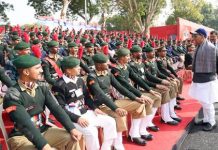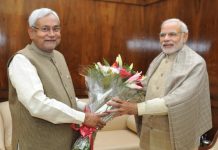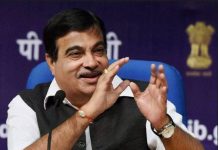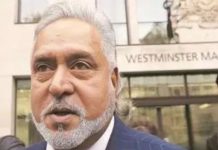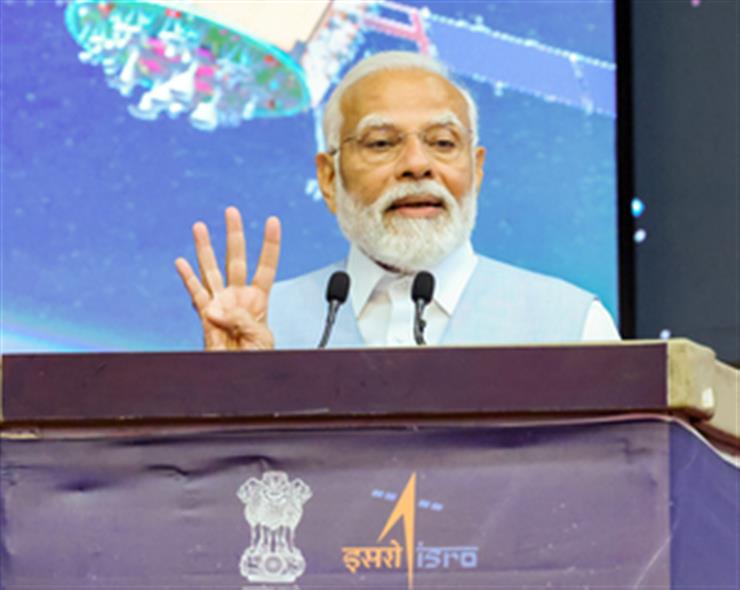
New Delhi: As India commemorates National Space Day this Friday, Prime Minister Narendra Modi’s vision for space development and reforms takes centre stage, highlighting their pivotal role in the success of last year’s Chandrayaan-3 mission. Leading scientists across the nation lauded the Prime Minister following the mission’s achievement, and their interactions with PM Modi were both inspiring and indicative of deep contemplation in this direction.
The National Space Day commemorates India’s landmark achievement as on August 23 last year, India became the fourth country in the world to land on the moon and the first to reach its southern polar region.
The theme for this year’s National Space Day is “Touching Lives while Touching the Moon: India’s Space Saga”.
ISRO Chairman S. Somanath in a video message said that the Prime Minister has strengthened the space ecosystem in the country through policy intervention.
As a prime minister, he has undertaken many initiatives to reform the space sector. The National Space Policy was announced in which the roles and responsibilities of the Department of Space have been clearly delineated. Similarly, under the new foreign direct investment policy for the space sector, private and foreign investments are now allowed with certain controls and regulations which was not possible earlier, Somanath said.
On the geospatial policy, the ISRO chief said that all the geospatial data and satellite data are now made available free of cost, up to five meters, to everybody so as to create a secondary effect on it. These are three important steps in terms of policy initiatives that the government has taken, piloted by the Prime Minister, he added.
Somanath also recalled how Prime Minister Modi took a small break from the BRICS summit to watch the live transmission of the Chandrayaan-3 mission’s soft landing on the lunar surface. “I remember our honourable Prime Minister, Modi ji, was there watching live transmission, and he was waving the flag.”
After returning from the BRICS summit, the Prime Minister on August 26 went to the ISRO Telemetry Tracking and Command Network (ISTRAC) in Bengaluru to greet the scientists behind the Chandrayaan-3 mission. It was the day when Prime Minister Modi announced that August 23 would be commemorated as the National Space Day.
B.N. Ramakrishna, Director, ISRO Telemetry, Tracking & Command Network, recalled how Prime Minister Modi boosted the morale of scientists when the Chandrayaan-2 mission’s soft landing failed. “He (PM Modi) was sitting in the visitors’ gallery, constantly monitoring the various parameters of Chandrayaan-2. Everything was going so smoothly… but at the last minute, we could not land properly on the moon, we had a hard landing… It took some time for all of us to digest. There was a pin-drop silence in the control centre, and the Prime Minister was also watching from the visitors’ gallery.
“Then after four to five minutes, when we were not able to communicate to the lander from our deep space antenna, we had to announce that it was not a soft landing. So with that, the Prime Minister came down from the visitors gallery, and consoled each one of us at that moment, because all of us were in great emotions. We thought that he was not going to come back. And we were all trying to analyze what went wrong… We were still having discussions in the meeting room till 4-5 a.m., about what went wrong and why we did not land properly. At that time, we got a message that the Prime Minister is coming and addressing us at 8 a.m. He has taken all of us into his confidence and he said ‘failures are part of the success. Do not worry today what you have missed. Please look at it and come back. And I am sure ISRO and India are going to be successful…’. So that was the kind of assurance he gave. And even he patted our former chairman.”
M. Sankaran, Director, UR Rao Satellite Centre (URSC) said, “I am here in ISRO for the last 38 years. The main difference I am seeing in the approach of ISRO is that earlier, what we do, how we do it, was not really known to anybody, only the outcome of that as a service was made available to the concerned departments or public, whatever it is. So it was only concentrating on the outcome. But nowadays, what we are seeing is that not only the outcome is essential, but what we are doing also should reach the public. It should be known to the public. That is the change I am seeing in recent years.”
Prime Minister Modi, according to Sankaran, was “very clear that we have to involve other than government agencies in the space activities that… finally resulted in the space sector reforms”.
ISRO Scientist Pavithra Shinde, who was also part of the Chandrayaan-3 mission, recalled how the Prime Minister suggested naming the landing site of Chandrayaan-3 as the ‘Shiv Shakti Point’ and also Prime Minister Modi’s emphasis on women’s power during the August 26 interaction with scientists.
Chandrayaan-3 was launched from Satish Dhawan Space Centre on July 14, 2023. The spacecraft entered lunar orbit on August 5, and became the first lander to touch down near the lunar south pole on August 23.


